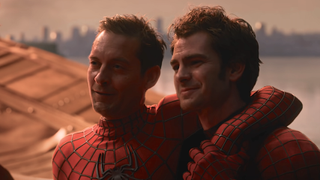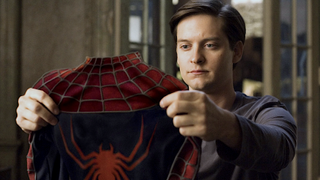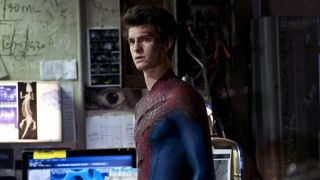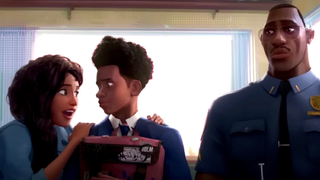I Need To Talk About The Great Power Of The Spider-Man Movies And Mental Health
With great power...

What do the best Spider-Man movies have in common? Well, besides showing Peter Parker take on some of the comic world’s most notorious villains and piss off J. Jonah Jameson? If you guessed tackling mental health issues, then you’d be correct. Over the years, the various film franchises about the beloved Web-Slinger haven’t shied away from touching on delicate topics, but instead, these great superhero movies opened up conversations about anxiety, depression, and even grief on multiple occasions.
I’ve had my fair share of struggles with mental health over the years, and so I’ve always felt a connection with Peter Parker, no matter if he’s in one of his iconic suits or just walking the streets as an angst-ridden New Yorker. I would even go as far as to say that each of these movies is made even better because of the conversations about mental health in the Spider-Man universe. Let me explain…

Peter Parker's Anxieties And The Stresses In The Tobey Maguire Movies Make Him An All-Time Great Spider-Man
Sam Raimi’s Spider-Man trilogy, though not always the best the franchise has to offer (looking at you, Spider-Man 3), had a habit of focusing on a myriad of mental health issues, especially when it came to Tobey Maguire’s Peter Parker. From high school graduate to fresh-faced superhero to seasoned yet flawed protector of the “Big Apple,” the first live-action version of the character went through a lot, and all those stresses, anxieties, moments of grief, and confusion shaped and guided him along the way.
This is especially true in Spider-Man 2 when Peter, due to the stress of the job, loses his superpowers and is forced to deal with his stress and get a handle on his anxieties before he can be the hero the city deserves. Only when he was responsible and taking care of himself did he fully understand his great power. This struggle and revelation added so much to Maguire’s version of the character, and made him an all-time great in the process.

Andrew Garfield's Performance In The Amazing Spider-Man Movies Perfectly Captured The Power Of Self-Confidence
Each of the three live-action Spider-Man franchises, as well as the animated Into the Spider-Verse movies, have centered on characters who are able to find a sense of confidence and self-assurance when suited up despite being awkward, neurotic, and self-conscious in their normal lives. One of the things I’ve always loved about Andrew Garfield’s take on the character in the Amazing Spider-Man movies was that his confidence was pretty much another superpower that gave him the edge in his various battles.
Sure, he’s a socially awkward mess of a young man when he’s Peter, but Garfield’s Spider-Man, maybe because he has the physical and emotional protection of a mask, is full of quips, quick action, and drive. Yeah, there’s the whole death of Gwen Stacy weighing him down in The Amazing Spider-Man 2, but Spidey can almost compartmentalize that tragic loss to save the day in the end. You could argue that this response is a negative trait, but you have to do what you have to do.

The Way The Tom Holland Movies Handle The Psychological Effects Of Thanos' Snap Was Impressive
Though Spider-Man: Homecoming took place before Thanos’ snap gave audiences one of the most unforgettable movie moments and one of the MCU’s landmark events in Avengers: Infinity War, every other movie in the Tom Holland saga is rooted in its fallout. The next two Spider-Man movies (Far From Home and No Way Home) both spent a considerable amount of time not just talking about the physical impact of the event, but also the psychological toll it had on everyone, especially Peter.
These long-term effects of the Snap, and its reversal in Avengers: Endgame, turned Holland’s Spider-Man from a young and naive teenager into an experienced hero with all kinds of issues he had to work out. Though technically the same person after being brought back from the beyond, the post-Snap Peter was less carefree, more centered, and more in tune with his mental and emotional well-being.

Spider-Man: No Way Home Explores How Grief And Past Trauma Shapes Us Through Its Three Peter Parkers
Pretty much every character in Spider-Man: No Way Home is shaped and impacted by some kind of grief, and that’s especially true for the three Peters. Peter #1 (Holland), Peter #2 (Maguire), and Peter #3 (Garfield) struggling to get over the loss of Aunt May, Uncle Ben, and Gwen Stacy, respectively, shapes their motivations as well as their plan to defeat the villains by giving them a second chance instead of simply sending them to their deaths, and that’s honestly one of the most heroic decisions in the history of the medium.
Whether we know it or not, we all carry our lost loved ones’ spirits and memories with us wherever we go. For the most part, we have overcome the immediate shock of the loss, but that grief is still there, weeks, months, and even years later, influencing our decisions and shaping who we are as people. We may not be trying to fix a multiversal crisis, but the rationale remains the same.

The Into The Spider-Verse Movies Have Brought Up New Mental Health Conversations
The animated Spider-Verse movies also go head-first into discussions about various mental health issues, especially those impacting Miles Morales (Shameik Moore) as he tries to find his place in the world. If being a teenager trying to balance school, friends, family, and normal obligations wasn’t hard enough, Miles is constantly on the verge of a full-fledged identity crisis throughout the first two movies in his franchise, and that makes his story so much more relatable.
These conversations, either directly or indirectly, have touched upon several different topics over the years like anxiety, stress, depression, guilt, panic attacks, and imposter syndrome through the lens of a teenage crime-fighter. This is also seen in The Spider Within: A Spider-Verse Story short film when Miles experiences a massive panic attack while thinking about the pressures and responsibilities of being Spider-Man. How his fears manifest into terrifying creatures is a tremendous and startling metaphor for our own anxieties and how ruminating on them can turn them into a nightmare.
With several upcoming Spider-Man projects on the way, I’m sure we’ll be seeing a lot more conversations about mental health for years to come, which is really cool to think about.
CINEMABLEND NEWSLETTER
Your Daily Blend of Entertainment News

Philip grew up in Louisiana (not New Orleans) before moving to St. Louis after graduating from Louisiana State University-Shreveport. When he's not writing about movies or television, Philip can be found being chased by his three kids, telling his dogs to stop barking at the mailman, or chatting about professional wrestling to his wife. Writing gigs with school newspapers, multiple daily newspapers, and other varied job experiences led him to this point where he actually gets to write about movies, shows, wrestling, and documentaries (which is a huge win in his eyes). If the stars properly align, he will talk about For Love Of The Game being the best baseball movie of all time.
Most Popular



